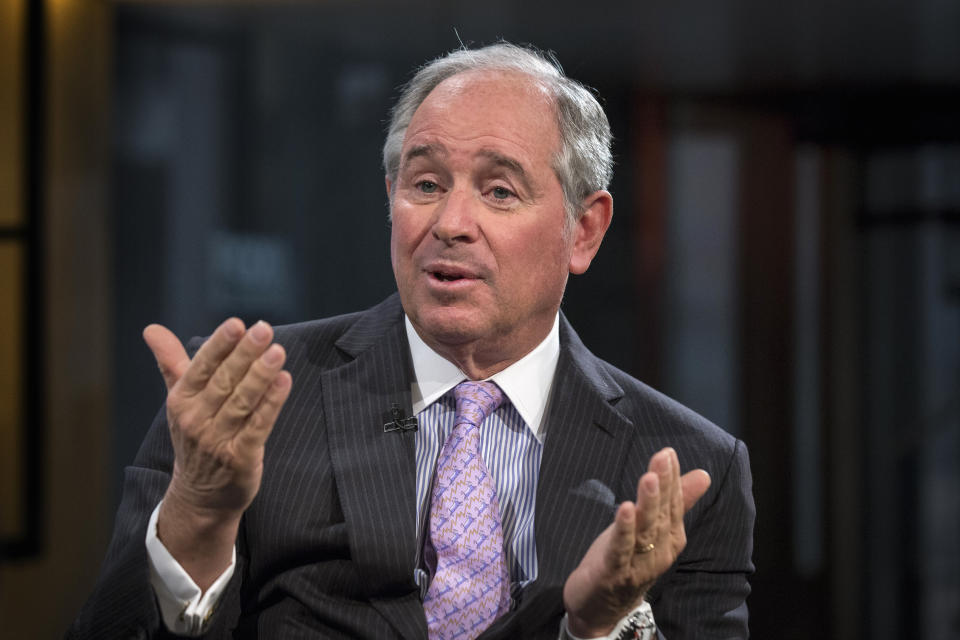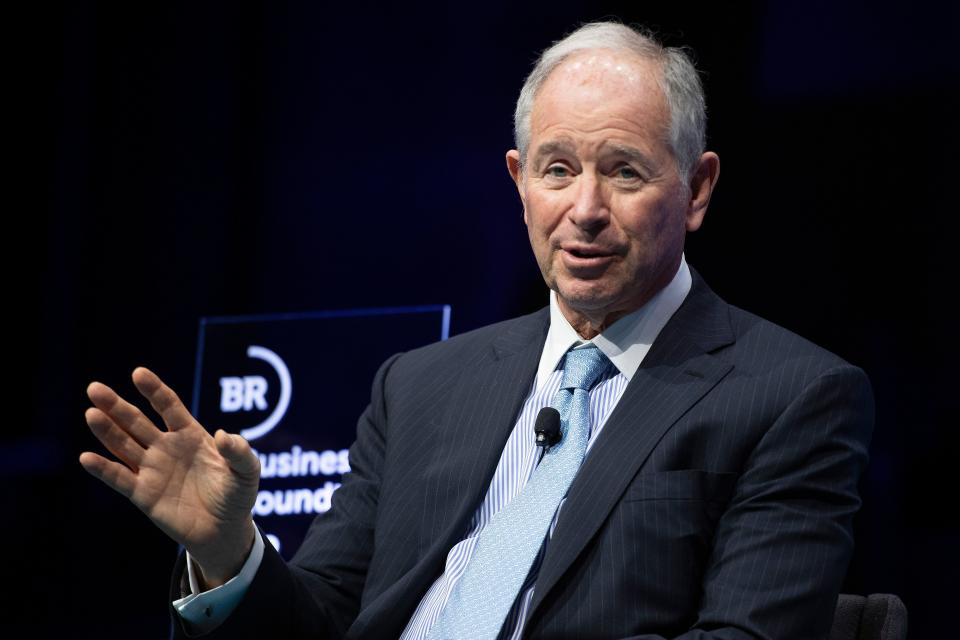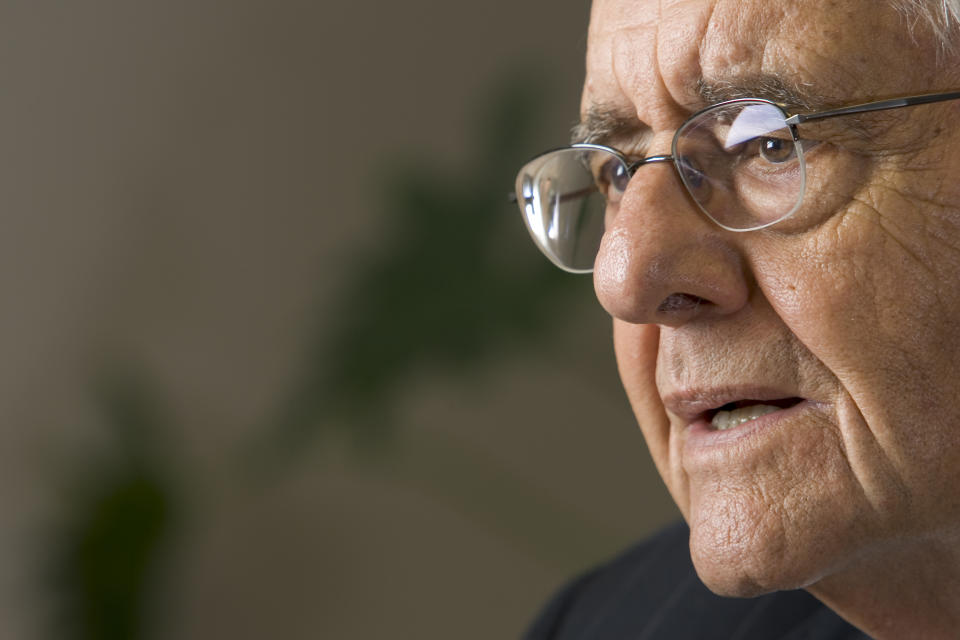YAHOO FINANCE PRESENTS: How Stephen Schwarzman built a private equity empire
In a new interview with Yahoo Finance, billionaire Stephen A. Schwarzman shares how he built his private equity empire The Blackstone Group (BX), and became one of the most sought-after CEOs for advice from world leaders.
His new memoir, "What It Takes: Lessons in the Pursuit of Excellence," was released on Tuesday. It details how in 34 years, Blackstone evolved from an upstart advisory shop to a global behemoth with $545 billion in assets under management.
The firm’s lines of business range across industries such as real estate, private equity, hedge funds and credit. The 72-year-old Schwarzman — who built it all — is listed as the 100th richest person in the world, and has an estimated fortune of $18.4 billion, according to Forbes.
In an interview with Yahoo Finance, he acknowledged that he was born at a time where attaining his level of success was easier.
"I was born in a time where, you know, it was easier than it is today," Schwarzman said.
"It was the second year of the post-World War II baby boom. So there weren't many people ahead of you,” the billionaire explained. “So, I think I probably could have figured out a route in today's world, but it was definitely easier when I was going to junior high school and high school and college and getting my first job."
[See also: Steve Schwarzman sees a 'wake-up call' for investors]
‘I wanted things to work well’

Growing up in a middle-class family in a Philadelphia suburb, Schwarzman folded handkerchiefs for ten cents an hour at Schwarzman's Curtains and Linens, a dry goods retailer his father inherited from his dad.
At an early age, he looked for opportunities, and suggested that his father expand the business into a nation-wide chain — an idea his father rejected.
Schwarzman always had big ambitions for his life, but he wasn't sure exactly what he wanted to be. In a job interview, he once described his ideal role as a "telephone switchboard," where he would take information, digest it, and create outputs.
A track star and president of his high school's student council, Schwarzman found leadership roles to be "always natural." That mindset continued for him in college, the Army, business school, and Wall Street.
"I always like to be in charge of something or lead the way or fix something that was not optimal or broken,” he said. “And it was comfortable. I sort of always wanted things to work well.”
After being waitlisted at Harvard, Schwarzman went to Yale where he discovered that he was underprepared academically.
On campus, his goal was to join the exclusive club Skull and Bones. He garnered the attention of the society's members by making the social scene more lively for the then all-male campus.
He also brought in ballet performances, and successfully lobbied to change the parietal rules that banned women from staying overnight in a dorm room.

$10,500
After graduation, he was offered a job in 1969 at the firm Donaldson Lufkin & Jenrette paying $10,000 per year. But Schwarzman countered Bill Donaldson’s offer by demanding $10,500, because he’d heard that there was another person from Yale making $10,000—and he wanted to be the highest-paid person in his class.
He eventually won the negotiation.
During the Vietnam War, he signed up for the Army Reserves and embarked for active-duty training six months after starting at DLJ.
At the training, his company underperformed because they were underfed compared to the others. Schwarzman challenged the hierarchy by pointing out the problem to the colonel.
After leaving camp, he went to Harvard Business School, where he became bored and wanted to drop out. Yet he also made a point to try to improve the school, and completed his degree.
He then joined Lehman Brothers, where his career took flight. In 1978, he advised Tropicana on its sale to Beatrice Foods for $488 million, his first-ever foray into dealmaking with no experience in the area — and a deal he did solo.
Schwarzman wrote that he went to Lehman “to be trained, to sit in the middle of Wall street with feeds running in from around the world, to be a telephone switchboard.”
In just six years, he became the youngest managing director, and was leading the firm’s mergers and acquisitions team.
After Lehman got in trouble with a disastrous trade in commercial paper under the leadership of Lew Glucksman, Schwarzman helped facilitate the sale to America Express.
Blackstone nearly failed
In 1985, Schwarzman teamed up with Pete Peterson to form The Blackstone Group. The initial fundraising process was incredibly challenging, with hundreds of rejections.
They eventually made headway with an investment from Japanese investment bank Nikko, and ended up pulling in $850 million.
Yet two years later, Blackstone nearly failed. At the time, Schwarzman approved a $330 million takeover of steel distribution company Edgcomb, which nearly destroyed the firm and led to Schwarzman being berated by an investor the point where he almost cried.
He called the situation one of "the defining moments" of the firm, and his career.
"We basically bought a company where two partners disagreed,” he said. “One thought it was going to be a big winner. The other one thought it was going to go bankrupt,” he said.
“I picked the first partner. We didn't have any processes. We were just sitting in front of my desk. I thought I was King Solomon at the age of 38. Guess what? I wasn't,” he added.

That near-catastrophic failure turned into a teachable moment for Schwarzman. It also resulted in a new investment process that involves folks at all levels.
Ideas are submitted in a written memorandum that's delivered two days before a meeting so people "don't' get hoodwinked by somebody flipping through charts." When the group convenes to go over the investment, everyone at the table must participate by pointing out risks, the probability of those risks, and how bad they might be.
"[The] people who bring the proposal realize that they are basically going to be intellectually filleted every time they come in the room, then it's never personal because it happens every time. And it makes the team be much better prepared. And it makes everyone who is at the table much better prepared."
Fast-forward to the present day, and Blackstone has grown into the world's largest private equity firm, with more than $545 billion in assets under management.
It's also become a highly competitive place to land a job. According to Schwarzman, less than 1% of candidates are accepted to work at Blackstone.
In fact, he seriously doubts that he would be hired if he were to apply because he didn't have the grades. Of course, that's not all Blackstone looks for when looking for “10s,” as he likes to call candidates.
"I think it's important that we look at different factors here at the firm," Schwarzman said. "The conservative way is, always hire the brightest person. I think it's important to be involved in student government of some type or a club or something where you demonstrate leadership.
He also said that he gravitates toward applicants “who are athletes only because you can take pain. If you're a good athlete, you push yourself to a point where it's not pleasant.”
Complicated negotiations
While he's built a massive empire in dealmaking, he's often sought after by world leaders for advice. He's been actively involved in the trade talks between the U.S. and China.
In the book, he wrote that these are "some of the most complicated negotiations" that he's ever experienced. He remains optimistic a deal will be reached at some point.
[Read more: US-China trade war effects are a 'net losing strategy': Stephen Schwarzman]
“I don't think there's anyone who knows how to handicap it. Except I think there is now a recognition on both sides that the decoupling of these two economies is really adversely affecting the world, global growth,” the billionaire investor said.
"And if you do that as a long-term strategy, that will have a depressing impact on global growth. And that's a net losing strategy,” Schwarzman said, adding that it’s not beneficial to either side to “decouple” their economies.
To date, he's given away hundreds of millions to philanthropy, most of which focus on education at all levels. He’s provided tuition assistance to inner-city high school students, and provided funding to the Massachusetts Institute of Technology (MIT) to build out a college dedicated to the study of artificial intelligence.
And while many of his peers are calling for changes to capitalism, he thinks it should start with education.
"I think capitalism needs to be reformed less than education has to be made better,” Schwarzman said. "If we had a much more qualified workforce, then capitalism per se would work better.”
He added that “to try and get capitalism to fix an entire society is a good objective. And companies should do what they can for that. But there are different levers in our system that actually have to come into play to make it all work."
Julia La Roche is a finance reporter at Yahoo Finance. Follow her on Twitter.

 Yahoo Finance
Yahoo Finance 

